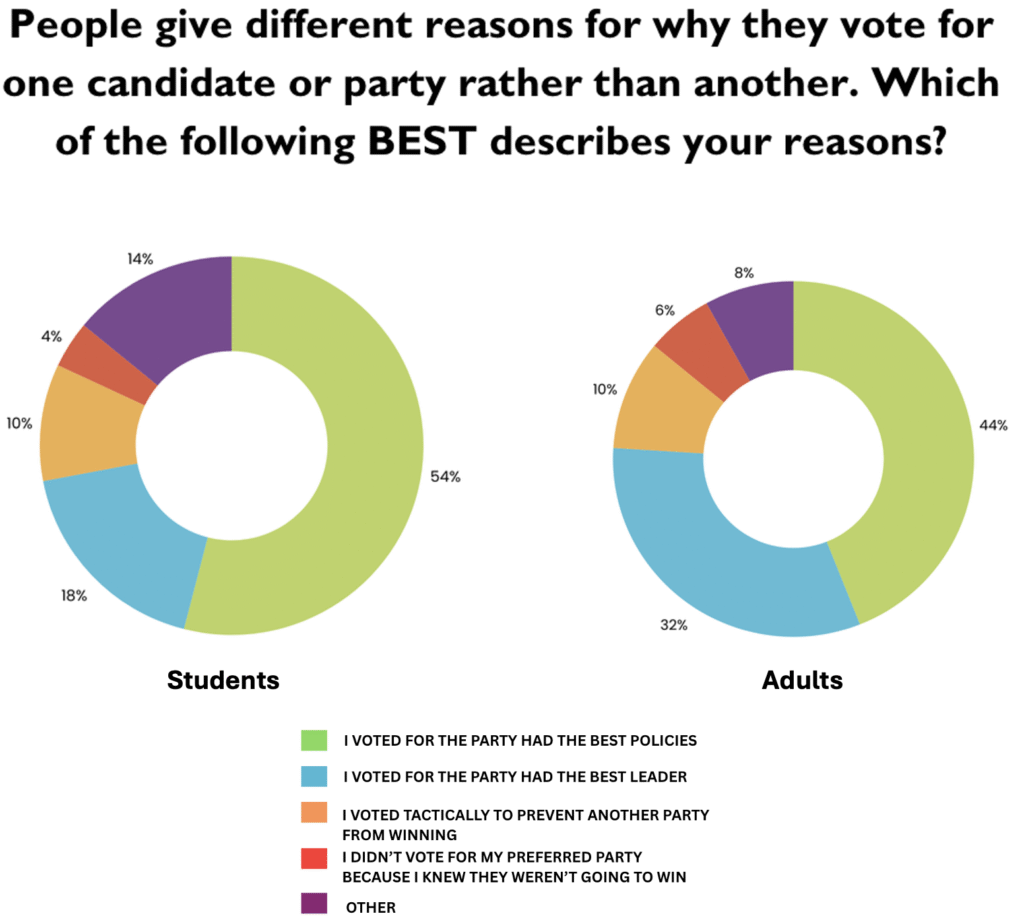The results of Student Vote Canada 2025 have sparked more discussion and analysis than ever before, with pundits and political experts weighing in on what they mean for the parties and for future elections.
While it’s encouraging to see student opinions taken seriously, we were especially interested in hearing directly from students themselves — what influenced their choices and what issues mattered most to them.
To explore these questions, we partnered with Abacus Data to conduct an exit survey with students who participated in the Student Vote Canada program. The goal was to better understand the factors that shaped their vote and amplify the voices of Canadian youth.
The exit survey includes results from 13,942 students in grades 4 to 12 across all provinces and territories.
What shaped the Student Vote results?
Policy drove students’ decisions more than party branding or the party leaders. Over half of students (54%) say that they voted for the party that they thought had the best policies or promises, while 18% say they voted primarily based on which party they thought had the best leader. Only 14% of students say they voted strategically — either to prevent another party or candidate from winning or because they felt their preferred choice had no chance of winning.
In comparison, a plurality of adults (44%) also said they voted based on policy, but adults were also much more inclined to vote based on the party leader (32%).

Students were also much more likely than adults to have made their decision close to the election date. About half of students (47%) made their decision the day they voted or a few days before. In contrast, 47% of adults say they made up their mind even before the election campaign began.
Students are engaged, independent voters
Students were engaged in the election. A large majority of students said they did some form of research before voting. Many students also reported having discussions around political issues and the election in class (44%), with friends (46%), and with family members (45%).
While students are certainly talking about political issues with others, they are ultimately independent voters. Nearly half (48%) of students said they voted the same way as at least one parent or caregiver. While 19% said they voted differently, and 32% were not sure if/how their parents or caregivers voted. Moreover, when asked about the most important factor influencing their vote, only 12% said they were primarily influenced by family and friends. This suggests that while many students align with their family’s views, a significant portion are forming independent political opinions — even within the same households.
How do students feel about the results and the future?
Students feel moderately happy with the results: 37% of students feel positive, 35% feel neutral, and 28% feel disappointed.
Just over half of students (52%) believe the prime minister will represent them and their concerns. Similarly, 52% feel well represented by their elected local candidate, whereas 48% believe a different local candidate would represent them better.
Students in BC, Alberta,Saskatchewan and Manitoba are most concerned about being represented, while those in Ontario and Atlantic Canada feel the candidates who won the general election will represent them well.
When asked their opinion on the most important step that the federal government can take to support young Canadians, more than half of the students selected items related to addressing cost-of-living or affordability concerns.
Conclusion
These results suggest that students who participated in the Student Vote program are policy-driven and are more interested in solutions to their concerns related to cost-of-living than they are in party branding or party leadership. While students are certainly influenced by their family and friends, they are also independent thinkers willing and able to make their own decisions about what they see as best for their future.
These results also highlight the importance of civic education and engaging young people in democracy early on. Among students who participated in Student Vote Canada 2025, 91% of students said they feel confident about voting in the future, including 45% who feel very confident.
For an additional summary of these results, please see the Abacus Data post here.